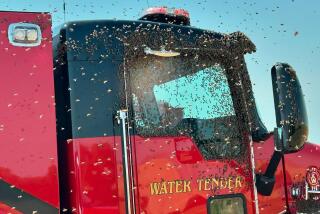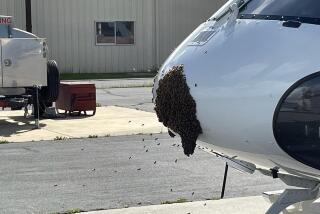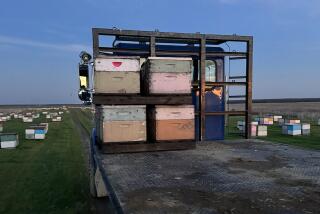2nd Killer Bee Find Raises No Alarm
Officials heading the search for Africanized honeybees in the Lost Hills area of Kern County said Monday that the discovery of a second swarm last week is no cause for alarm or for major expansion of search-and-destroy efforts in the 462-square-mile quarantine area.
Because experts examining the comb in the original colony have said that as many as four swarms of the so-called killer bees may have flown from the site during the past year, the second discovery on Wednesday was not unexpected, officials said.
‘Would Be Horrible’
“If they find four swarms, that’s great. If they find 400, that would be horrible,” said Thomas Rinderer, head of the U.S. Department of Agriculture’s bee research center in Baton Rouge, La., and a member of the bee science advisory committee set up by the state Department of Food and Agriculture.
The committee has advised state officials that since there are 9,200 colonies of domestic honeybees in the quarantine area already, it is expected that the relatively small number of Africanized bees will be genetically bred out of existence over the next year or so.
Africanized bees are feared because of their aggressive nature and because they are poor pollinizers and honey gatherers, experts say.
The first hive of Africanized bees was discovered in June in an oil field near Lost Hills, 45 miles northwest of Bakersfield, but was not identified and reported until late last month.
Once the original find was identified, government regulators quarantined all commercial hives within 20 miles of the original colony and launched a search for any of the bees that may have swarmed away from the site.
The second colony of Africanized bees--found in a commercial hive two miles from the original fox den site--came as teams of experts continued the job of inspecting and sampling each of the commercial bee colonies in the area.
They reported that only one the 256 hives in a commercial apiary belonging to Riverside beekeeper Milton Knoefler contained Africanized bees. The hive was destroyed, and the remaining hives in the apiary will be closely watched for 30 days to see if more Africanized bees hatch, according to state officials.
Quarantine Area
Knoefler may also be charged with taking another 250 hives out of the quarantine area and driving them to Riverside, according to officials in Riverside and Kern counties. It is a misdemeanor to take bees from the quarantine area before they are examined and cleared, they said.
By the end of last week, the 40 men and women searching the area had sampled 3,076 colonies in 35 of 97 apiaries, according to Hal Sparks, spokesman for the Africanized bee project office in Bakersfield.
More to Read
Sign up for Essential California
The most important California stories and recommendations in your inbox every morning.
You may occasionally receive promotional content from the Los Angeles Times.










